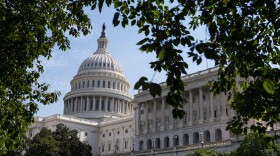Congress has recessed for the holidays, and it has gone another year without passing legislation that would boost funding for Route 66.
The lack of movement on reauthorizing the Route 66 Corridor Preservation Program means there will be no cost-share grants aimed at reviving old tourist spots in struggling towns where the Mother Road passed through.
The program has helped finance projects like rehabilitating parts of the historic Rialto Theatre in Winslow, Arizona, and the Rock Cafe restoration in Stroud, Oklahoma. It's administered by the National Park Service.
Ken Busby, executive director of the Tulsa, Oklahoma-based Route 66 Alliance, told Public Radio Tulsa the lack of dedicated federal funding for preservation work puts people trying to save the Mother Road in a tough spot.
"Having that federal aid that often provides a matching grant option really helps us leverage state and local dollars. So, it’s really critically important if we’re going to maintain this 2,448-mile stretch of road. We just have to have some help to do it," Busby said.
Legislation to designate the Mother Road a National Historic Trail stalled in the House and Senate.
Route 66, also called the "Mother Road," was born in 1926 after the Bureau of Public Roads launched the nation's first federal highway system, bringing together existing local and state roads from Chicago through St. Louis to Los Angeles. Small towns opened shops, motels and gas stations to pump revenue into local economies as the nation's car culture took off.
One of the first roads in the U.S. highway system, the highway ran through eight states, connecting tourists with friendly diners in small towns.
The route changed a number of times through the years. It eventually became less of a destination thanks to new interstate highways.
The World Monuments Fund in 2008 listed Route 66 on the “Watch List of 100 Most Endangered Sites.”








